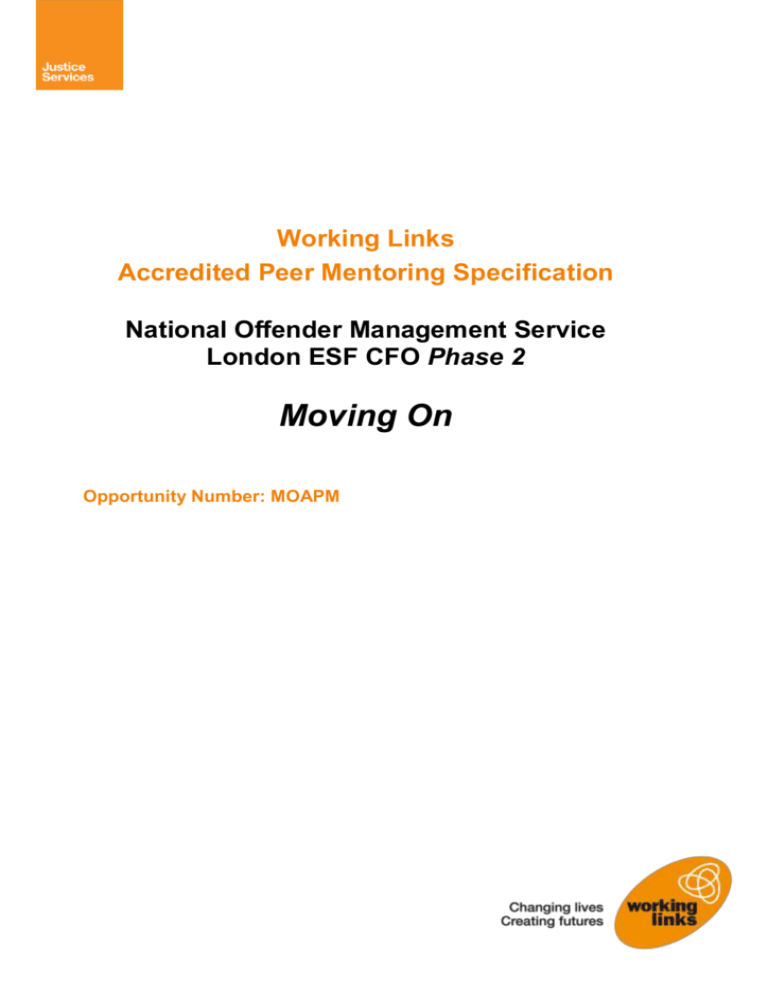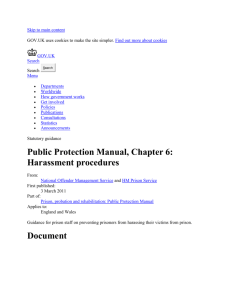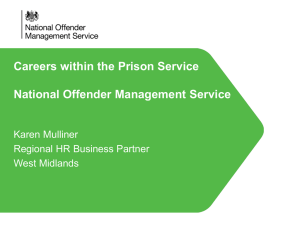Specification - Working Links
advertisement

Working Links Accredited Peer Mentoring Specification National Offender Management Service London ESF CFO Phase 2 Moving On Opportunity Number: MOAPM Contents 1. Moving On – Purpose of Opportunity and Introduction to Moving On 2. Service Delivery Requirements 3. Staffing Requirements Annexes Annex A Working Links Partner Questionnaire Annex B Scoring Information and Criteria 1. Moving On - Purpose and Introduction to Moving On Purpose of Opportunity 1.1 This specification sets out the delivery requirements which apply to the National Offender Management Service for the purpose of procuring services as described as NOMS London Phase 2 – Moving On. 1.2 This provision will contribute to a reduction in re-offending through; 1.3 Managing mentoring activity for Moving On participants Delivering accredited Peer Mentoring training opportunities for Moving On participants. The overall aims are: Achieve 2000 accredited Peer Mentoring qualifications over the life of the contract. Engage with offenders and ex-offenders and offer mentoring support in custodial and community settings Mentors are to motivate participants to develop the tools needs to integrate within mainstream society Mentors are to support participants with developing strategies to minimise or eliminate offending behaviour Mentors are to support the wider contract by encouraging participants to engage in employment focused activity Introduction to the Moving On Programme 1.4 This is the second phase of ESF funding to provide offender intervention to reduce offending rates by improving the employment prospects of offenders. 1.5 The contract will run between 1st Jan 2012 and 31st Dec 2014 1.6 The contract package area covers all London Boroughs and 8 London Prisons 1.7 Custodial services will be delivered by Working Links 1.8 Community services will be delivered by Working Links and 4 Subcontractors 1.9 The service will engage 20,000 starts, achieving employment, further learning and a range of soft outcomes 1.10 The service will provide interventions to address criminogenic needs as described in the NOMS London intervention Strategy (7 pathways) 1.11 A case management model will be utilised to support participants through the programme. 2. Service Delivery Requirements 2.1 Service providers must provide a flexible delivery model that can be delivered in both the custodial or community setting. 2.2 Service Providers must provide a core offer which has two broad generic elements: Delivery of Accredited Peer Mentoring Qualifications at Level 2 Management of mentoring activity across the contract. 2.3 Service providers must provide a strategy for the engagement of participants in the custodial and community setting 2.4 The learning should lead to the possibility of achieving an appropriate accredited qualification. 2.5 Service providers must provide a strategy for effective pairing of mentors and mentees 2.6 Service Providers must provide management services to ensure mentoring activity is delivered in an appropriate manner. 2.7 The service should support the wider aims of the Moving on contract which are to provide Services to improve the employment prospects of offenders 2.8 The service provider must work with the Lead provider (Working Links) to develop the service to ensure it meets the needs of participants. 2.9 Service Providers are required to demonstrate their capacity to record and provide accurate and timely auditable data and learner records. 2.10 Service Providers must ensure that there is dedicated resource in place to support delivery across the London region (community) and London prison estates (custody). .2.11 Service Providers are required to demonstrate their capability to ensure that effective and comprehensive quality assurance arrangements are in place. 3 Staffing/Security Requirements 3.1 Service Providers must ensure that all staff working within the prison estates undertakes the requisite prison induction programme(s) and training before starting work. It is the responsibility of the establishment to provide the induction. 3.2 It is the responsibility of the service provider to ensure that there is a sufficient complement of staff/volunteers, appropriately qualified to carry out their duties with the requisite level of security clearance to cover all the contracted activity. These staff will have undergone the appropriate security training. 3.3 The service provider must support the security of the environment within the control of prison service security standards. 3.4 The service provider must carry out a risk assessment on its employees in the place of work and provide immunisation as required. 3.5 The service provider supported by the Lead Provider is required to work to each prison’s Local Security Strategy and its staff will be required to contribute to ‘active security’ set out in any developed Service Level Agreement. 3.6 Staff employed, by the service provider, are not required to be involved in ‘rub down’ or ‘wanding’ of learners entering or leaving the learning environment. Neither will they be responsible for escorting learners to and from learning environments or for escorting learners to and from toilets during learning sessions or to designated rest areas at agreed break times. Security Clearance 3.6 The Subcontractor must take particular note of information regarding the security clearance of staff. Enhanced Criminal Records Bureau (CRB) checks are a requirement for all staff as well as those working one-to-one with vulnerable people in the adult estate. For staff working in the High Security Estate, a level of Security Clearance from a Counter Terrorism Check (CTC) is required. This type of clearance may take longer than needed for standard, or enhanced, CRB checks. 3.7 Working Links will develop a single mechanism to ensure all security requirements are met, in line with Prison Service Orders (PSOs) and Prison Service Instructions (PSIs), the National Security Framework and the Data Protection Act. Code of Practice 3.8 Any staff of the service provider working in a prison must comply with the stated aims of the National Offender Management Service (NOMS). 3.9. Staff must be aware of, and comply with, all current PSOs and PSIs applicable to their duties. Staff should also comply with any general legislation. 3.10 Staff must treat all other staff, prisoners and visitors with respect and decency at all times and abide by national and local prison policies. 3.11 Particular attention must be paid to the following: National and Local Security Instructions set out in the National and Local Security Frameworks Policies for Race Equality (PSO 2800) and Equal Opportunities (PSO 8010) Health and Safety policy statement (PSO 3801) Conveyance of unauthorised Articles (PSO 1100) and the requirements of the Offender Management Act 2008 Professional Standards (PSO 1215) Violence Reduction Strategy (PSO 2750) 3.12 The full list of PSOs and PSIs can be found at: http://www.justice.gov.uk/guidance/prison-probation-and-rehabilitation Exclusion 3.13 The Governing Governor has absolute right and discretion to exclude any member of staff from entering the establishment. This may be due to issues concerning unprofessional or inappropriate conduct. Usual practice will be to advise the member of staff’s employer of the exclusion in advance, where appropriate, and feasible. Any unprofessional, inappropriate or criminal conduct by the subcontractor Staff may be subject to internal or external investigation. Governors will normally seek to provide details of reasons for exclusion as far as possible, subject to the needs of both organisation’s and provided that no investigation is compromised, and the identity of any third party is protected. 4 Funding Model 4.1 4.2 Working Links will look to offer a funding model that incorporates service fees and payment by results. Details will be negotiated on an individual basis with the successful partner. 5 Innovation 5.1 The evaluation of returns will look at how partners have demonstrated their awareness of client group issues and their capability to address these problems appropriately.







